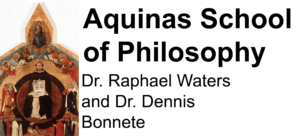Please note: This was taken from the original post on the Aquinas Philosophy website run by John Vennari. The Aquinas School of Philosophy ended in early 2020 and as of now, has not been revitalized.
The start of something great
The Aquinas School of Philosphy opened in 2005 with a course of Philosophical Psychology, followed by the Science of Ethics, and completing a course of Metaphysics in August, 2008; and another course in Philosophical Psychology in 2009.
The courses began with sixteen students and have been flourishing ever since. They come from Canada and the USA with distance learning students in various American states, New Zealand, andAustralia. Among them may be counted three retired professors, a woman columnist, the editor of an international paper, a priest, students and working people of every kind.
The enthusiasm of current students has amazed some, counting among their numbers various ages, occupations, and coming from Lockport, Niagara Falls, Buffalo, Williamsville, and so on. It is rewarding to hear a retired lawyer say, “I wish I had found this School five years ago.” Then there is the woman who said that she “would not miss a class for anything.” They come through snow and rain. A wonderful spirit has developed in the classes with coffee, cookies and conversation.
The inspiration is found in the teachings from a number of sources but St. Thomas Aquinas is the master who gives us a true philosophy with sound conclusions in perfect harmony with Catholic teachings.
True philosophy is not widely taught
People today fail to appreciate the importance of true philosophy. Even certain priests have been heard to say, “My parishioners would not be interested.” We have proved them wrong for people today are starved for the truth. There is a great demand out there for the solutions to the great problems of our time. The universities fail to present the truth today offering instead a stew of opinions while the student is left to decide for himself. The youth rarely learn the preambles of faith and the utterly certain proofs of these teachings. The attacks on the existence of God alone, becoming more intense lately so that we can call this an atheistic age, would justify the existence of the Aquinas School of Philosophy.
There are no fees or educational requirements to attend classes. Common sense and a good will permit entry into a class. Lack of educational development will not prohibit anyone from attending classes at any time. Late entry to a course, although it might handicap one a little at the beginning, will not impede one’s pursuit of learning. Let no one hesitate to join a class.
The method consists of formal presentation of the matter in accordance with the systematic order appropriate to the science and will not consist of the mere presentation of the history of philosophy or brief readings extracted from the works of philosophers as is done in so many of the contemporary institutions. Reference will be made to the history of philosophy but it will be subordinated to the science itself. However, as the historian of philosophy, Etienne Gilson informed us, history is the laboratory of the philosopher.
We will learn to appreciate the truth
Following in the footsteps of the great masters, we shall seek the evidence for wisdom found in their writings in an effort to meet the challenges of our time. Just as Aristotle took all that was true before him, St. Thomas Aquinas examined and defended all that was taught prior to his age, and then he erected these truths into a new and higher synthesis which has been examined and developed in our era. So we shall be the beneficiary of the labors of these and other more recent intellectual giants as we struggle for wisdom, critically examining, discussing, and finally demonstrating the truth of the vast body of learning which is the Aristotelico-Thomistic teaching. Proceeding from purely rational principles and facts, sound conclusions will be discovered which will satisfy the yearning of the human heart to understand the world in which we live.
It is recommended that students take the courses seriously for the sake of themselves, their country, and their faith. The great problems of our times are mostly philosophical whether they concern human rights, economics, justice, medical ethics, and preambles to faith or some other issue. The pursuit of sound philosophy is the best antidote to the debased culture of our day, not only in the confused body cultural, but also in the body politic, and body economic. We shall see solutions springing from the teachings of the great masters of the past and present.
All classes were recorded and can be purchased from an independent source.(from this webpage)
On September 11, 2009, the Aquinas School of Philoslopy began its course on the Science of Ethics. Sadly, this was left unfinished due to Dr. Waters’ illness and death. Dr. Dennis Bonnette, retired professor of Philosophy of Niagara University, and co-founder of the Aquinas School of Philosophy took over after the death of Dr. Waters.
